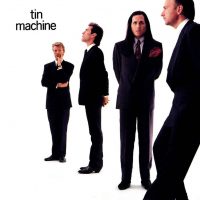 Written by: David Bowie
Written by: David Bowie
Recorded: February – April 1989
Producers: Tin Machine, Tim Palmer
Engineer: Justin Shirley-Smith
Released: 22 May 1989
Available on:
Tin Machine
Personnel
David Bowie: vocals, guitarReeves Gabrels, Kevin Armstrong: guitar
Tony Sales: bass guitar, vocals
Hunt Sales: drums, vocals
Written by David Bowie, ‘Crack City’ is an anti-drug song on Tin Machine’s self-titled debut album.
Bowie had been writing drug songs – both pro and anti – since ‘The London Boys’ in the mid-Sixties. Having conquered a debilitating cocaine addiction in the late Seventies, he was well placed as an observer of the crack cocaine epidemic sweeping America in the following decade.
Anti-drug songs were commonplace in the Eighties, in styles ranging from La Toya Jackson’s ‘Just Say No’ to U2’s ‘Running To Stand Still’, to the Furious Five’s ‘White Lines (Don’t Don’t Do It)’ and Public Enemy’s ‘Night Of The Living Baseheads’.
Built around a driving two-chord loop, Tin Machine’s offering was among the less subtle of the genre, with Bowie taking aim at dealers and users with an earnest yet crudely expletive-laden screed.
I don’t wanna go on preaching but I’ve only heard a couple of anti-drug songs. Frankly, I don’t think many people are writing them, but I’ve not heard one that’s effective because they’re all intellectual, they’re all literate, and they’re written for other writers.
Melody Maker, 20 May 1989
Lou Reed – who broke ground in the Sixties by singing about hard drugs, and with considerably more style and originality than Tin Machine – was invoked in a couplet in the final verse: “They’ll bury you in velvet/And place you underground”.
I think Lou writes in a much more detached manner from me. Lou’s the kind of guy who sits back and watches what’s going on and takes notes. He’s very New York. I feel he could have been a feature writer of some kind if he wasn’t a musician. He’d write these little essays and they’d go in New Yorker or maybe something a bit punchier like Bomb magazine. He’s a natural journalist. He’s almost become a kind of musical Woody Allen. The writer, the observer, the Samuel Pepys of New York…As he’s growing older he’s becoming the writer that he was probably always going to become. A short story writer. He writes in the narrative form very clearly. For me there’s still a lot of symbolism or instinctive or emotive lyric writing – I don’t know where it comes from – that explains the way I feel or the atmosphere I’m in. There’s a couple of lines in ‘Crack City’ on this album – They’ll bury you in velvet/And place you underground – which had intent. The drug dirge – and this is not a slight on Lou because Lou is clean – the sound that one associates with that particular lifestyle is very much personified by the early Velvets. I had hoped that I gave that away in those two lines.
Q magazine, June 1989
‘Crack City’ was recorded in Nassau in the Bahamas in early 1989.
The plan was to resume in Nassau, at Compass Point. Obviously, it was going to be a very different vibe. The rooms were very small and more of a dry-sounding space. That made for variety on the record – songs like ‘Crack City’ had a much more closed-in feeling.
David Bowie: Ultimate Record Collection (Uncut)
Live performances
‘Crack City’ was performed during Tin Machine’s two world tours, from their first scheduled show in New York on 14 June 1989 to their final concert in Tokyo on 17 February 1992.
A recording from La Cigale in Paris on 25 June 1989 was released on the ‘Prisoner Of Love’ 12″ and CD singles on 30 October 1989.


